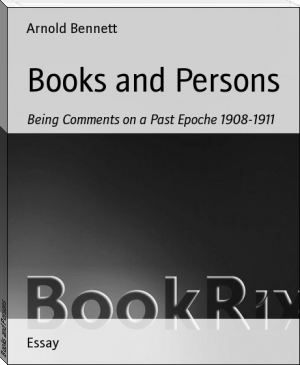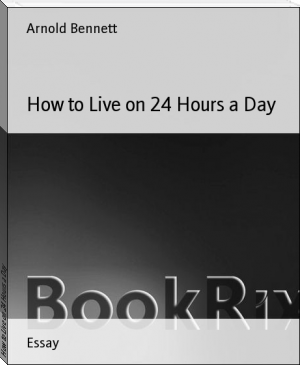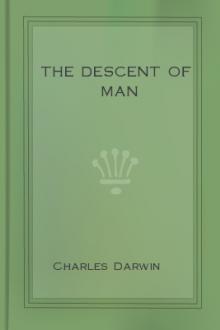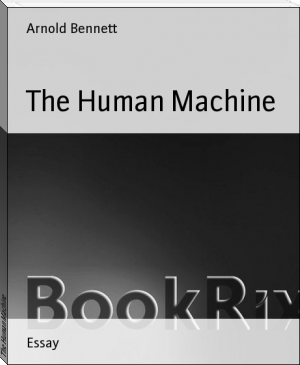Books and Persons - Arnold Bennett (phonics readers .TXT) 📗

- Author: Arnold Bennett
Book online «Books and Persons - Arnold Bennett (phonics readers .TXT) 📗». Author Arnold Bennett
to name it. The thing was merely infantile and absurd. Moreover, I violently object to booksellers sitting in judgment on novels.
LETTERS OF QUEEN VICTORIA
[_16 May '08_]
The result of _Murray_ v. _The Times_ is very amusing. I don't know why the fact that the _Times_ is called upon to pay L7500 to Mr. John Murray should make me laugh joyously; but it does. Certainly the reason is not that I sympathize with the libelled Mr. Murray. The action was a great and a wonderful action, full of enigmas for a mere man of letters like myself. For example, Mr. Murray said that his agreement with the "authors" (I cannot imagine how Lord Esher and Mr. A.C. Benson came to be the "authors" of the late Queen's correspondence) stipulated that two-thirds of the profits should go to the "authors" and one-third to Mr. Murray. Secondly, Mr. Murray said that he paid the authors L5592 14s. 2d. Thirdly, he said that his own profit was L600. Hence L600 is the half of L5592 14s. 2d. I have no doubt that there exists some quite simple explanation of this new arithmetic; only it has not occurred to me, my name not being Colenso. The whole enterprise was regal, as befitted. Proof-corrections cost twice as much as the original setting up! A mere man of letters would be inclined to suspect that the printing was begun too soon; it is usual to postpone setting-up a book until the book is written. Balzac partially beggared himself by ignoring this rule. Balzac, however, was not published by Mr. Murray. L950 was paid to the amanuensis! Oh, amanuensis, how I wonder who you are, up above the world so high, like a fashionable novelist in the sky! And so on.
* * * * *
The attitude of Tunbridge Wells (the most plutocratic town in England, by the way) towards the book was adorable. "Mr. Daniel Williams, a bookseller and librarian, of Tunbridge Wells, said that after the review by 'Artifex' people complained that the price of the book was too high. No complaints were made before that." They read their _Times Literary Supplement_ at the Wells, and they still wait for it to thunder, and when it has thundered--and not before--they rattle their tea-trays, and the sequel is red ruin! Again, Mr. Justice Darling, in his ineptly decorated summing-up, observed that it was hardly too much to say that "the plaintiff's house--the house of Murray," was a national institution. It would be hardly too much to say that also the house of Crosse and Blackwell is a national institution, and that Mr. Justice Darling is a national institution. By all means let us count the brothers Murray as a national institution, even as an Imperial institution. But let us guard against the notion, everywhere cropping up, that such "houses" as the dignified and wealthy house of Murray are in some mysterious way responsible for English literature, part-authors of English literature, to whom half of the glory of English literature is due. It is well to remember now and then that publishers who have quite squarely made vast sums out of selling the work of creative artists are not thereby creative artists themselves. A publisher is a tradesman; infinitely less an artist than a tailor is an artist. Often a publisher knows what the public will buy in literature. Very rarely he knows what is good literature. Scarcely ever will he issue a distinguished book exclusively because it is a distinguished book. And he is right, for he is only a tradesman. But to judge from the otiose majesty of some publishers, one would imagine that they had written at least "Childe Harold." There is the case of a living publisher (not either of the brothers Murray) whose presence at his country chateau is indicated to the surrounding nobility, gentry, and peasantry by the unfurling of the Royal standard over a turret.
* * * * *
To return to the subject, the price at which the house of Murray issued the "Letters of Queen Victoria" was not "extortionate," having regard to the astounding expenses of publication. But why were the expenses so astounding? If the book had not been one which by its intrinsic interest compelled purchase, would the "authors" have been remunerated like the managers of a steel trust? Would the paper have been so precious and costly? Would the illustrations have so enriched photographers? And would the amanuensis have made L350 more out of the thing then Mr. Murray himself? The price was not extortionate. But it was farcical. The entire rigmarole combines to throw into dazzling prominence the fact that modern literature in this country is still absolutely undemocratic. The time will come, and much sooner than many august mandarins anticipate, when such a book as the "Letters of Queen Victoria" will be issued at six shillings, and newspapers will be fined L7500 for saying that the price is extortionate and ought not to exceed half a crown. Assuredly there is no commercial reason why the book should not have been published at 6s. or thereabouts. Only mandarinism prevented that. Mr. Murray's profits would have been greater, though "authors," amanuenses, photographers, paper-makers, West-End booksellers, and other parasitic artisans might have suffered slightly.
FRENCH PUBLISHERS
[_23 May '08_]
It has commonly been supposed that the publication of Flaubert's "Madame Bovary" resulted, at first, in a loss to the author. I am sure that every one will be extremely relieved to learn, from a letter recently printed in _L'Intermediaire_ (the French equivalent of _Notes and Queries)_, that the supposition is incorrect. Here is a translation of part of the letter, written by the celebrated publishers, Poulet-Malassis, to an author unnamed. The whole letter is very interesting, and it would probably reconcile the "authors" of the correspondence of Queen Victoria to the sweating system by which they received the miserable sum of L5592 14s. 2d. from Mr. John Murray for their Titanic labours.
October 23, 1857.
"I think, sir, that you are in error as to Messrs. Levy's method of doing business. Messrs. Levy buy for 400 francs [L16] the right to publish a book during four years. It was on these terms that they bought the stories of Jules de la Madeleine, Flaubert's 'Madame Bovary,' etc. These facts are within my knowledge. To take an example among translations, they bought from Baudelaire, for 400 francs, the right to publish 6000 copies of his Poe. We do not work in this way. We buy for 200 francs (L8) the right to publish an edition of 1200 copies.... If the book succeeds, so much the better for the author, who makes 200 francs out of every edition of 1200 copies. If M. Flaubert, whose book is in its third edition, had come to us instead of to Messrs. Levy, his book would already have brought him in 1000 francs (L40); during the four years that Messrs. Levy will have the rights of his book for a total payment of 400 francs, he might have made two or three thousand francs with us.... Votre bien devoue,
"A.P. MALASSIS."
* * * * *
We now know that Flaubert made L16 in four years out of "Madame Bovary," which went into three editions within considerably less than a year of publication. And yet the house of Levy is one of the most respectable and grandiose in France. Moral: English authors ought to go down on their knees and thank God that English publishers are not as other publishers. At least, not always!
WORDSWORTH'S SINGLE LINES
[_30 May '08_]
I have had great joy in Mr. Nowell Charles Smith's new and comprehensive edition of Wordsworth, published by Methuen in three volumes as majestic as Wordsworth himself at his most pontifical. The price is fifteen shillings net, and having regard to the immense labour involved in such an edition, it is very cheap. I would sooner pay fifteen shillings for a real book like this than a guinea for the memoirs of any tin god that ever sat up at nights to keep a diary; yea, even though the average collection of memoirs will furnish material to light seven hundred pipes. We have lately been much favoured with first-rate editions of poets. I mention Mr. de Selincourt's Keats, and Mr. George Sampson's amazing and not-to-be-sufficiently-lauded Blake. Mr. Smith's work is worthy to stand on the same shelf with these. A shining virtue of Mr. Smith's edition is that it embodies the main results of the researches and excavations not only of Professor Knight, but, more important, of the wonderful Mr. Hutchinson, whose contributions to the _Academy_, in days of yore, were the delight of Wordsworthians.
* * * * *
Personally, I became a member of the order of Wordsworthians in the historic year 1891, when Matthew Arnold's "Selections" were issued to the public at the price of half a crown. I suppose that Matthew Arnold and Sir Leslie Stephen were the two sanest Wordsworthians of us all. And Matthew Arnold put Wordsworth above all modern poets except Dante, Shakespeare, Goethe, Milton, and Moliere. The test of a Wordsworthian is the ability to read with pleasure every line that the poet wrote. I regret to say that, strictly, Matthew Arnold was not a perfect Wordsworthian; he confessed, with manly sincerity, that he could not read "Vaudracour and Julia" with pleasure. This was a pity and Matthew Arnold's loss. For a strict Wordsworthian, while utterly conserving his reverence for the most poetic of poets, can discover a keen ecstasy in the perusal of the unconsciously funny lines which Wordsworth was constantly perpetrating. And I would back myself to win the first prize in any competition for Wordsworth's funniest line with a quotation from "Vaudracour and Julia." My prize-line would assuredly be:
_Yea, his first word of greeting was,--_
_"All right...._
It is true that the passage goes on:
_Is gone from me...._
But that does not impair the magnificent funniness.
* * * * *
From his tenderest years Wordsworth succeeded in combining the virtues of Milton and of _Punch_ in a manner that no other poet has approached. Thus, at the age of eighteen, he could write:
_Now while the solemn evening shadows sail,_
_On slowly-waving pinions, down the vale;_
_And fronting the bright west, yon oak entwines_
_Its darkening boughs...._
Which really is rather splendid for a boy. And he could immediately follow that, speaking of a family of swans, with:
_While tender cares and mild domestic loves_
_With furtive watch pursue her as she moves,_
_The female with a meeker charm succeeds...._
Wordsworth
LETTERS OF QUEEN VICTORIA
[_16 May '08_]
The result of _Murray_ v. _The Times_ is very amusing. I don't know why the fact that the _Times_ is called upon to pay L7500 to Mr. John Murray should make me laugh joyously; but it does. Certainly the reason is not that I sympathize with the libelled Mr. Murray. The action was a great and a wonderful action, full of enigmas for a mere man of letters like myself. For example, Mr. Murray said that his agreement with the "authors" (I cannot imagine how Lord Esher and Mr. A.C. Benson came to be the "authors" of the late Queen's correspondence) stipulated that two-thirds of the profits should go to the "authors" and one-third to Mr. Murray. Secondly, Mr. Murray said that he paid the authors L5592 14s. 2d. Thirdly, he said that his own profit was L600. Hence L600 is the half of L5592 14s. 2d. I have no doubt that there exists some quite simple explanation of this new arithmetic; only it has not occurred to me, my name not being Colenso. The whole enterprise was regal, as befitted. Proof-corrections cost twice as much as the original setting up! A mere man of letters would be inclined to suspect that the printing was begun too soon; it is usual to postpone setting-up a book until the book is written. Balzac partially beggared himself by ignoring this rule. Balzac, however, was not published by Mr. Murray. L950 was paid to the amanuensis! Oh, amanuensis, how I wonder who you are, up above the world so high, like a fashionable novelist in the sky! And so on.
* * * * *
The attitude of Tunbridge Wells (the most plutocratic town in England, by the way) towards the book was adorable. "Mr. Daniel Williams, a bookseller and librarian, of Tunbridge Wells, said that after the review by 'Artifex' people complained that the price of the book was too high. No complaints were made before that." They read their _Times Literary Supplement_ at the Wells, and they still wait for it to thunder, and when it has thundered--and not before--they rattle their tea-trays, and the sequel is red ruin! Again, Mr. Justice Darling, in his ineptly decorated summing-up, observed that it was hardly too much to say that "the plaintiff's house--the house of Murray," was a national institution. It would be hardly too much to say that also the house of Crosse and Blackwell is a national institution, and that Mr. Justice Darling is a national institution. By all means let us count the brothers Murray as a national institution, even as an Imperial institution. But let us guard against the notion, everywhere cropping up, that such "houses" as the dignified and wealthy house of Murray are in some mysterious way responsible for English literature, part-authors of English literature, to whom half of the glory of English literature is due. It is well to remember now and then that publishers who have quite squarely made vast sums out of selling the work of creative artists are not thereby creative artists themselves. A publisher is a tradesman; infinitely less an artist than a tailor is an artist. Often a publisher knows what the public will buy in literature. Very rarely he knows what is good literature. Scarcely ever will he issue a distinguished book exclusively because it is a distinguished book. And he is right, for he is only a tradesman. But to judge from the otiose majesty of some publishers, one would imagine that they had written at least "Childe Harold." There is the case of a living publisher (not either of the brothers Murray) whose presence at his country chateau is indicated to the surrounding nobility, gentry, and peasantry by the unfurling of the Royal standard over a turret.
* * * * *
To return to the subject, the price at which the house of Murray issued the "Letters of Queen Victoria" was not "extortionate," having regard to the astounding expenses of publication. But why were the expenses so astounding? If the book had not been one which by its intrinsic interest compelled purchase, would the "authors" have been remunerated like the managers of a steel trust? Would the paper have been so precious and costly? Would the illustrations have so enriched photographers? And would the amanuensis have made L350 more out of the thing then Mr. Murray himself? The price was not extortionate. But it was farcical. The entire rigmarole combines to throw into dazzling prominence the fact that modern literature in this country is still absolutely undemocratic. The time will come, and much sooner than many august mandarins anticipate, when such a book as the "Letters of Queen Victoria" will be issued at six shillings, and newspapers will be fined L7500 for saying that the price is extortionate and ought not to exceed half a crown. Assuredly there is no commercial reason why the book should not have been published at 6s. or thereabouts. Only mandarinism prevented that. Mr. Murray's profits would have been greater, though "authors," amanuenses, photographers, paper-makers, West-End booksellers, and other parasitic artisans might have suffered slightly.
FRENCH PUBLISHERS
[_23 May '08_]
It has commonly been supposed that the publication of Flaubert's "Madame Bovary" resulted, at first, in a loss to the author. I am sure that every one will be extremely relieved to learn, from a letter recently printed in _L'Intermediaire_ (the French equivalent of _Notes and Queries)_, that the supposition is incorrect. Here is a translation of part of the letter, written by the celebrated publishers, Poulet-Malassis, to an author unnamed. The whole letter is very interesting, and it would probably reconcile the "authors" of the correspondence of Queen Victoria to the sweating system by which they received the miserable sum of L5592 14s. 2d. from Mr. John Murray for their Titanic labours.
October 23, 1857.
"I think, sir, that you are in error as to Messrs. Levy's method of doing business. Messrs. Levy buy for 400 francs [L16] the right to publish a book during four years. It was on these terms that they bought the stories of Jules de la Madeleine, Flaubert's 'Madame Bovary,' etc. These facts are within my knowledge. To take an example among translations, they bought from Baudelaire, for 400 francs, the right to publish 6000 copies of his Poe. We do not work in this way. We buy for 200 francs (L8) the right to publish an edition of 1200 copies.... If the book succeeds, so much the better for the author, who makes 200 francs out of every edition of 1200 copies. If M. Flaubert, whose book is in its third edition, had come to us instead of to Messrs. Levy, his book would already have brought him in 1000 francs (L40); during the four years that Messrs. Levy will have the rights of his book for a total payment of 400 francs, he might have made two or three thousand francs with us.... Votre bien devoue,
"A.P. MALASSIS."
* * * * *
We now know that Flaubert made L16 in four years out of "Madame Bovary," which went into three editions within considerably less than a year of publication. And yet the house of Levy is one of the most respectable and grandiose in France. Moral: English authors ought to go down on their knees and thank God that English publishers are not as other publishers. At least, not always!
WORDSWORTH'S SINGLE LINES
[_30 May '08_]
I have had great joy in Mr. Nowell Charles Smith's new and comprehensive edition of Wordsworth, published by Methuen in three volumes as majestic as Wordsworth himself at his most pontifical. The price is fifteen shillings net, and having regard to the immense labour involved in such an edition, it is very cheap. I would sooner pay fifteen shillings for a real book like this than a guinea for the memoirs of any tin god that ever sat up at nights to keep a diary; yea, even though the average collection of memoirs will furnish material to light seven hundred pipes. We have lately been much favoured with first-rate editions of poets. I mention Mr. de Selincourt's Keats, and Mr. George Sampson's amazing and not-to-be-sufficiently-lauded Blake. Mr. Smith's work is worthy to stand on the same shelf with these. A shining virtue of Mr. Smith's edition is that it embodies the main results of the researches and excavations not only of Professor Knight, but, more important, of the wonderful Mr. Hutchinson, whose contributions to the _Academy_, in days of yore, were the delight of Wordsworthians.
* * * * *
Personally, I became a member of the order of Wordsworthians in the historic year 1891, when Matthew Arnold's "Selections" were issued to the public at the price of half a crown. I suppose that Matthew Arnold and Sir Leslie Stephen were the two sanest Wordsworthians of us all. And Matthew Arnold put Wordsworth above all modern poets except Dante, Shakespeare, Goethe, Milton, and Moliere. The test of a Wordsworthian is the ability to read with pleasure every line that the poet wrote. I regret to say that, strictly, Matthew Arnold was not a perfect Wordsworthian; he confessed, with manly sincerity, that he could not read "Vaudracour and Julia" with pleasure. This was a pity and Matthew Arnold's loss. For a strict Wordsworthian, while utterly conserving his reverence for the most poetic of poets, can discover a keen ecstasy in the perusal of the unconsciously funny lines which Wordsworth was constantly perpetrating. And I would back myself to win the first prize in any competition for Wordsworth's funniest line with a quotation from "Vaudracour and Julia." My prize-line would assuredly be:
_Yea, his first word of greeting was,--_
_"All right...._
It is true that the passage goes on:
_Is gone from me...._
But that does not impair the magnificent funniness.
* * * * *
From his tenderest years Wordsworth succeeded in combining the virtues of Milton and of _Punch_ in a manner that no other poet has approached. Thus, at the age of eighteen, he could write:
_Now while the solemn evening shadows sail,_
_On slowly-waving pinions, down the vale;_
_And fronting the bright west, yon oak entwines_
_Its darkening boughs...._
Which really is rather splendid for a boy. And he could immediately follow that, speaking of a family of swans, with:
_While tender cares and mild domestic loves_
_With furtive watch pursue her as she moves,_
_The female with a meeker charm succeeds...._
Wordsworth
Free e-book «Books and Persons - Arnold Bennett (phonics readers .TXT) 📗» - read online now
Similar e-books:





Comments (0)